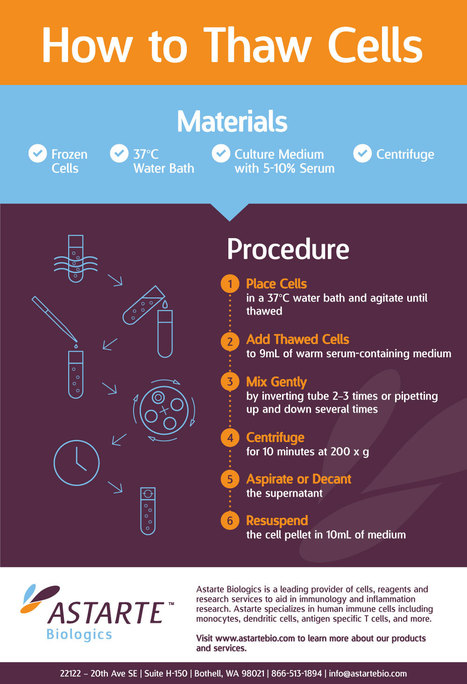
Rapid thawing is critical to immune cell viability. Get a proven cell thawing protocol and other tips here: https://astartebio.com/blog/ask-a-scientist-how-does-astarte-cryopreserve-cells/
Get Started for FREE
Sign up with Facebook Sign up with X
I don't have a Facebook or a X account

 Your new post is loading... Your new post is loading...
 Your new post is loading... Your new post is loading...

Alfredo Corell's curator insight,
July 27, 2013 2:59 PM
Cancer immunotherapy critically relies on the efficient presentation of tumor antigens to T-cells to elicit a potent anti-tumor immune response aimed at life-long protection against cancer recurrence. Recent advances in the nanovaccine field have now resulted in formulations that trigger strong anti-tumor responses. Nanovaccines are assemblies that are able to present tumor antigens and appropriate immune-stimulatory signals either directly to T-cells or indirectly via antigen-presenting dendritic cells. This review focuses on important aspects of nanovaccine design for dendritic cells, including the synergistic and cytosolic delivery of immunogenic compounds, as well as their passive and active targeting to dendritic cells. In addition, nanoparticles for direct T-cell activation are discussed, addressing features necessary to effectively mimic dendritic cell/T-cell interactions. |

Krishan Maggon 's curator insight,
June 18, 2015 3:46 AM
HighlightsFeatures & InnovationsIn FocusAbout A*STAR Research|Register|News|SitemapDermatologyMobilizing the skin’s defense cells
Immune cells interact in surprising ways when responding to skin injuries Published online 10 June 2015 
Krishan Maggon 's curator insight,
June 18, 2015 3:48 AM
About A*STAR Research|DermatologyMobilizing the skin’s defense cells Immune cells interact in surprising ways when responding to skin injuries Published online 10 June 2015

Alfredo Corell's curator insight,
February 10, 2013 5:55 AM
Most ovarian cancer patients are diagnosed with late stage disease that is unresponsive to existing therapies. In a new study, researchers from the Perelman School of Medicine at the University of Pennsylvania School of Medicine show that a two-step personalized immunotherapy treatment — a dendritic cell vaccine using the patients’ own tumor followed by adoptive T cell therapy — triggers anti-tumor immune responses in these type of patients. Four of the six patients treated in the phase I trial responded to the therapy, the investigators report this month in OncoImmunology.
Direct link to the journal: http://www.landesbioscience.com/journals/oncoimmunology/article/22664/?show_full_text=true& |



be rapid and gentle to your cells